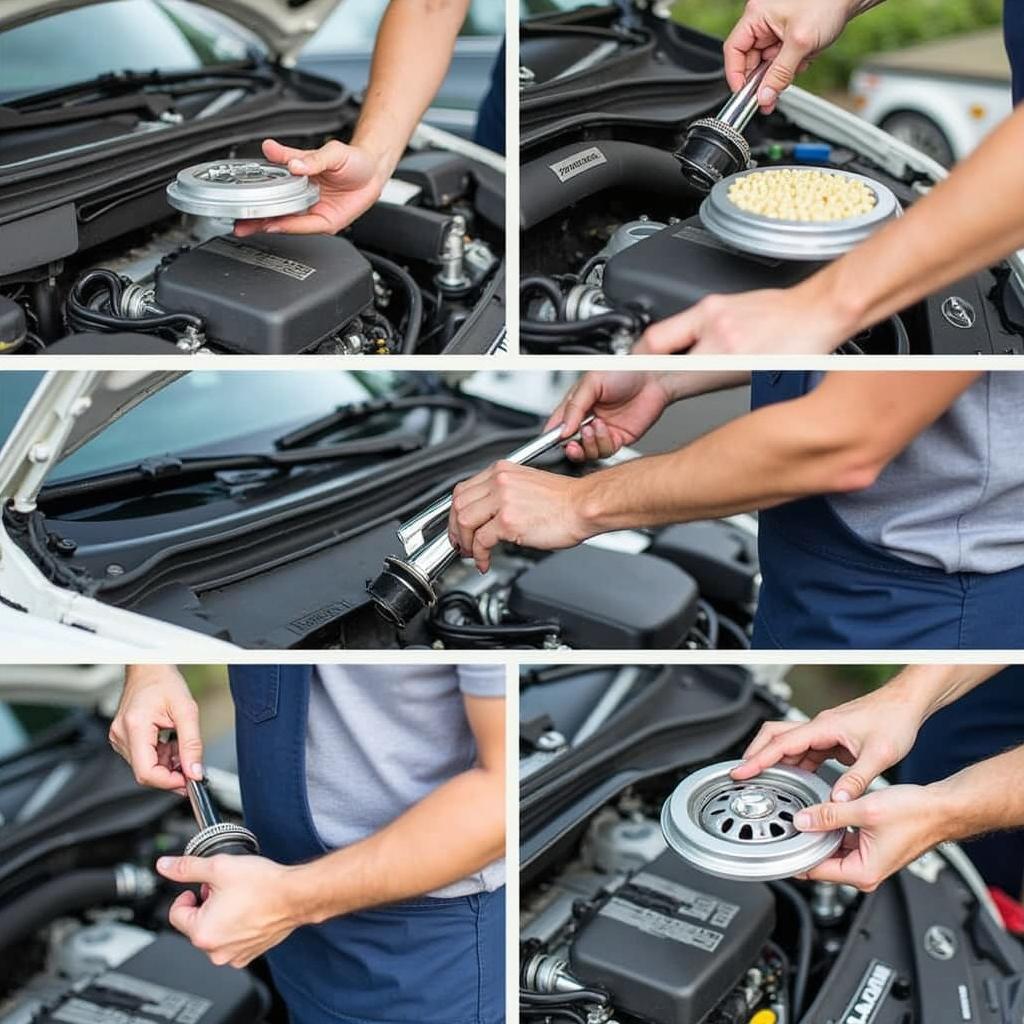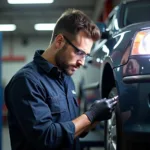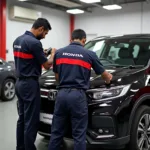Car servicing can feel like a mystery, especially when it comes to knowing what parts actually need replacing. Understanding What All Should Be Replaced In Car Servicing isn’t just about keeping your car running smoothly; it’s about safety, fuel efficiency, and avoiding costly repairs down the road. This comprehensive guide will demystify the process, explaining the key components typically replaced during a service and why.
Knowing what’s included in a major car service can help you budget and plan accordingly. It’s important to remember that not all car services are created equal, and the specific parts replaced will depend on factors like the make and model of your vehicle, its age, mileage, and your driving habits.
Essential Parts Replaced During Car Servicing
Several components are routinely checked and often replaced during a standard car service. These include vital fluids, filters, and other wear-and-tear items that contribute to your car’s performance and longevity.
Fluids
- Engine Oil: This lubricant is crucial for minimizing friction between engine components, preventing overheating, and ensuring smooth operation. Regular oil changes are the cornerstone of car maintenance.
- Coolant: Coolant regulates the engine’s temperature, preventing it from overheating or freezing. It needs periodic replacement to maintain its effectiveness.
- Brake Fluid: Brake fluid transmits the force from your foot on the brake pedal to the brake calipers, enabling your car to stop safely. Over time, brake fluid can absorb moisture, reducing its effectiveness.
- Transmission Fluid: This fluid lubricates the moving parts within the transmission, ensuring smooth gear changes.
Filters
- Oil Filter: This filter removes contaminants from the engine oil, keeping it clean and extending the life of your engine.
- Air Filter: The air filter prevents dust, debris, and other pollutants from entering the engine, ensuring optimal combustion.
- Cabin Air Filter: This filter cleans the air that enters the cabin, protecting passengers from allergens and pollutants.
Other Wear-and-Tear Items
- Spark Plugs: Spark plugs ignite the air-fuel mixture in the engine cylinders, initiating combustion. Worn-out spark plugs can reduce fuel efficiency and engine performance.
- Brake Pads and Rotors: These components are responsible for stopping your car. They wear down over time and require periodic replacement.
- Drive Belts: Drive belts power various engine accessories, such as the alternator, power steering pump, and air conditioning compressor.
Understanding Service Intervals
Knowing how often to replace these components is key. Refer to your car’s owner’s manual for recommended service intervals, as these vary depending on the make and model. Don’t forget that driving conditions, such as extreme temperatures or stop-and-go traffic, can also influence how often certain parts need replacing. If you’re unsure about your car’s service schedule, consult a qualified mechanic.
Identifying Signs of Wear and Tear
Recognizing the signs that your car needs servicing can prevent more serious problems down the line.
- Unusual noises: Squealing brakes, grinding gears, or knocking sounds from the engine can all indicate a problem.
- Fluid leaks: Check for leaks under your car. Different colored fluids can indicate leaks from different systems.
- Warning lights: Pay attention to any warning lights on your dashboard.
- Decreased performance: Reduced fuel efficiency, sluggish acceleration, or difficulty starting the engine could signal the need for a service.
How long does it take to service a car? Find out more by clicking on this link: how long does it take to service a car. This resource can help you plan your service appointment effectively.
The Importance of Regular Car Servicing
Regular car servicing is an investment, not an expense. It helps maintain your car’s value, ensures optimal performance, enhances safety, and can prevent costly repairs in the future. Skipping regular services can lead to more significant problems and potentially void your warranty.
“Regular maintenance is the key to a long and healthy life for your car,” says John Smith, ASE Certified Master Technician. “Just like regular checkups with a doctor, consistent car servicing can catch small problems before they become major headaches.”
Conclusion
Knowing what all should be replaced in car servicing empowers you to make informed decisions about your vehicle’s maintenance. By understanding the key components involved and the importance of regular service intervals, you can ensure your car stays safe, reliable, and performs at its best for years to come. Don’t underestimate the importance of proactive maintenance. Find out more about servicing your Tempo car by visiting our page on how to give service by tempo car.
FAQ
- How often should I service my car?
- What is the difference between a major and minor service?
- How much does car servicing typically cost?
- Can I service my car myself?
- What happens if I skip a car service?
- How do I choose a reputable car service center?
- What should I do if my car breaks down between services?
For further assistance, please contact us via WhatsApp: +1(641)206-8880, or Email: [email protected]. Our customer support team is available 24/7 to answer your queries and provide the best solutions. You might also be interested in learning more about creating service invoices. You can find valuable information on our page: how to make car service invoice in tally erp 9. Also, if you own a Maruti car, you can find helpful information on checking your service history: how to check service history of a maruti car.


